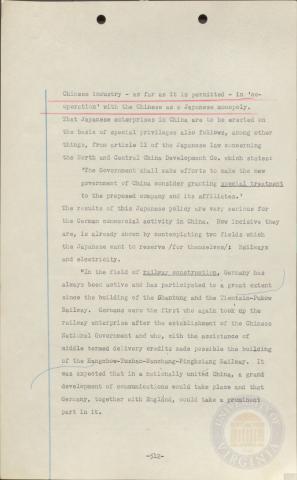
Page 512
| Parent | Collaboration between Japan, Germany and Italy Vol. VI |
|---|---|
| Date | |
| Language | English |
| Collection | Tavenner Papers & IMTFE Official Records |
| Box | Box 15 |
| Folder | Japan, Germany, Italy Collaboration Vol 6 |
| Repository | University of Virginia Law Library |
Chinese industry - as far as it is permitted - in 'co- operation’ with the Chinese as a Japanese monopoly.
That Japanese enterprises in China are to be erected on the basis of special privileges also follows, among other things, from article 11 of the Japanese law concerning the North and Central China Development Co. which states:
‘The Government shall make efforts to make the new government of China consider granting special treatment to the proposed company and its affiliates.1 The results of this Japanese policy are very serious for the German commercial activity in China. How incisive they are, is already shown by contemplating two fields which the Japanese want to reserve /for themselves/: Railways and electricity.
"In the field of railway construction^ Germany has always been active and has participated to a great extent
since the building of the Shantung and the Tientsin-Pukow
Railway. Germans were the first who again took up the railway enterprise after the establishment of the Chinese National Government and who, with the assistance of middle termed delivery credits made possible the building of the Hangchow-Yushan-Nanchang-Pinghsiang Railway. It was expected that in a nationally united China, a grand development of communications would take place and that Germany, together with England, would take a prominent part in it.
